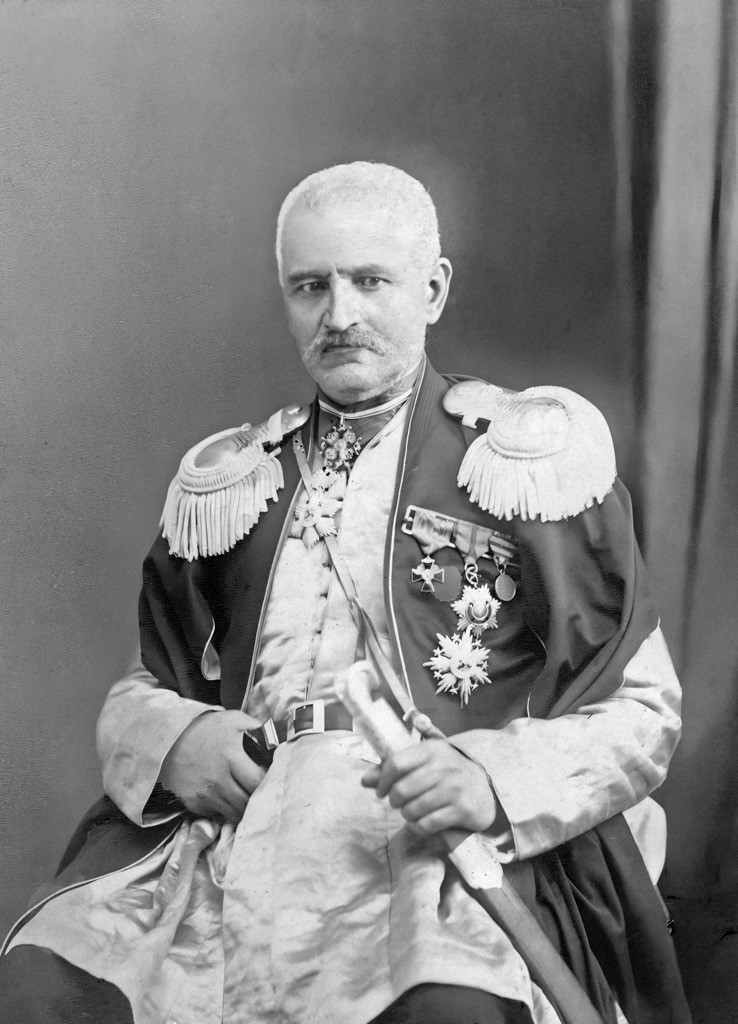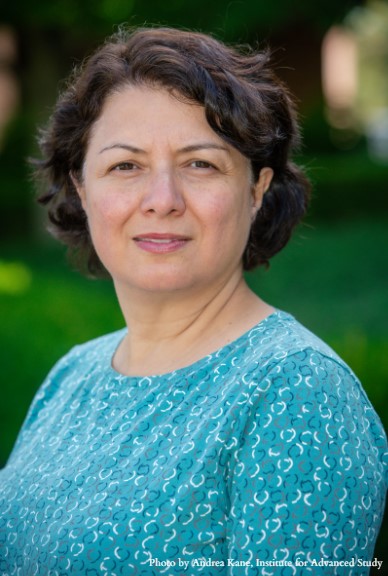One of the earliest modern intellectuals to advocate for reform in Islam by drawing parallels with Western thought was Mīrzā Fatḥ-ʿAlī Ākhūndzāde (also known as Akhundov) (born in 1812 in Nukha, Qajar Iran and died in 1878 in Tiflis, Russian Empire). In his work, The Letters of Kamāl al-Dawlah, Ākhūndzāde refers to his vision of reform using the term “Protestantism”, thus directly reflecting that his inspiration came from Christianity and highlighting his line of analogy. The original text, written in Azerbaijani (Arabic script) between 1863 and 1864, was entitled Kəmalüddövlə məktubları. In 1866, with the help of his diplomat and writer friend, Mīrzā Yūsuf Mustashār al-Dawla (1823–1895), Ākhūndzāde translated the work into Persian and gave it the title Maktūbāt-i Kamāl al-Dawla. He further expanded the Persian version by adding notes, and it became the standard version for future publications.
In these epistolary essays between the fictional Indian prince, Kamāl al-Dawla, and the Iranian prince, Jalāl al-Dawla, Ākhūndzāde expresses his own thoughts, criticisms and insights, as well as his reformist idea of “Protestantism in Islam,” using the voice of Kamāl al-Dawla. The work begins with a glossary of terms from “European languages” for which it was difficult to find equivalents in Islamic languages. It reveals Ākhūndzāde’s intellectual influences, his engagement with Western philosophy, and his interpretation of philosophical terms (Maktūbāt, ed. Muʿminī, 9–14; all references are to this Persian edition).
The first letter opens by informing us that Kamāl al-Dawla, after travelling to England, France and America, has come to Iran, thus establishing from the outset Ākhūndzāde’s Western inspirations and the comparative nature of his thoughts. He offers archaic nationalism in place of the Islam imposed by the Arabs and expresses nostalgia for ancient pre-Islamic Persian kings. He even criticises “the prophet of the Arabs” (24), suggesting that Islam in Iran is a foreign phenomenon and the root cause of all its poverty, backwardness and ignorance (20–1).
Protestantism as Liberalism, Humanism and Women’s Rights
In The Letters of Kamāl al-Dawlah, Ākhūndzāde’s critique of Islam primarily focuses on certain boundaries shariʿa imposes on Muslims. He explicitly encourages readers to break through these boundaries by advocating for individual and social liberalism, intellectual freedom and the opening up of society. However, he is careful to clarify that he is bidding not for atheism but for reform (see Ākhūndzāde’s letter in the Supplements to The Letters Kamāl al-Dawlah, 228). He also pleads for reform in the shape of respecting human rights (ḥuqūq al-nās or ḥuqūq-e bashariyyat) (12, 177, 181). Furthermore, he is not indifferent to the plight of women and children. He criticises the Iranians’ ways of child education (46–7, 73) as well as the treatment of women and gender relations in Islam, and particularly targets polygamy and the mandatory hijab as injustices against women (46, 126–36, 178–82; also see, Kia, “Women, Islam and Modernity”).
Despite this, Ākhūndzāde remains realistic, expressing little hope for a Protestantization of Islam. He acknowledges that the ʿulamā will never permit liberals and free thinkers to express their ideas (55–6), and he explicitly blames the Prophet of Islam for blocking all avenues of reform and progress by presenting himself as the most intelligent of all time (ʿaql-e awwalīn u ākharīn) and superior to everyone, in both the past and the future (afżal- guẕashtagān u āyandagān) (148).
Protestantism and Anti-clerics
In his autobiography Ākhūndzāde reflects on the early moments of his disdain for the Islamic clergy (ʿulamā) and their abuse of religious authority. It was the Azerbaijani poet and teacher Mīrzā Shafīʿ Vāżeḥ (1794–1852), under whom Ākhūndzāde was learning calligraphy (Nastaʿliq) when training to become a Mulla, who vilified his intentions and instilled into him an aversion to the clergy. Ākhūndzāde later admitted, “The veil of ignorance was lifted from my eyes, and I began to detest the clergy and subsequently changed my intention [of becoming a mullah].” (Akhundzadeh, “An Autobiography of Akhundzadeh,” Collected Dramatic Works, 311.) Ākhūndzāde maintained a close relationship with Mīrzā Shafīʿ Vāżeḥ and, later in Tiflis, he participated in his sessions at the Dīvān-e ʿaql or Dīvān-e ḥikmat (“The court of intellect”), where rationalism, intellectual inquiry and criticism of both the clergy and the government were promoted. In his works Ākhūndzāde openly censures the ʿulamā (see, for instance, The Letters, 71).
Protestantism, Patriotism and Freemasonry
In his call for progress and the spread of liberalism, humanism and patriotism through the Protesantisation of Islam, Ākhūndzāde advocated for the development of Freemasonry, closely linking the two—Protestantism and Freemasonry—just as they were connected in Christianity. On the intimate association of Protestantism and Freemasonry Hamburger Fremdenblatt (13 June 1917) states, “the one rests on the other as on its foundation … Freemasonry is inconceivable without Protestantism” (quoted in Liagre, “Protestantism and Freemasonry,” 163).
As a way of imposing his version of Protestantisation, Ākhūndzāde suggests formatting religion from the top, drawing on Olivier Roy’s terminology, by proposing that the king should establish Freemasonry lodges (farāmūsh-khāna) in order to free the nation of religious fanatism, dogma and absurd beliefs (56, 63–4) (see below).
Protestantism as a Guarantee of the Survival of Islam
Ākhūndzāde advocates for the pursuit of reason, while Islam is retained solely as a marker of national identity, thus being accommodated as part of Muslims’ cultural heritage. He further argues for the understanding of Islam’s core essence and the stripping away of unnecessary, superfluous traditions and rituals—an approach reminiscent of the Protestant movement, which German church historian Berndt Hamm describes as “normative centration” (normative Zentrierung) (Hamm, 1992). Through the voice of his protagonist, Kamāl al-Dawlah, Ākhūndzāde warns:
“The survival of the religion of Islam is possible only when you understand its essence through common sense and knowledge while remaining Muslim so that the nation should be distinguished from other nations. … You should liberate yourself from all (Islam’s) austere obligations known as God’s rights (ḥuqūq Allāh), just as the English and Americans and some other Europeans who are Protestant have done. That is, they outwardly remain Christian, but inwardly they are followers of the intellect.” (115)
Ākhūndzāde provides examples of Protestantism-like movements in religion that predate Christian Protestantism, referencing ideas promoted by the Nizari Ismaili leader, ʿAlā Dhikrihi al-Salām (1126–66) (see pp. 117–138), and the Indian school of Charvak (see pp. 139, 143).
Ākhūndzāde: An Emic Critic
Ākhūndzāde’s critical perspective is clearly emic, as he was raised with the intention of becoming a Mullah. He was educated in Persian and Arabic and studied the Qurʾan, jurisprudence (fiqh) and legal methodology (uṣūl al-fiqh). It was only later, when he began learning Russian and subsequently became a translator of Oriental languages for the Caucasian viceroy of the Russian government, that he was exposed to Western culture. In this context, Azerbaijani figures like Abbasqulu aga Bakikhanov (1794–1847), a fervent advocate of European philosophy and sciences, played a significant role in his intellectual development. For his conception of Protestantism in Islam Ākhūndzāde cites the English historian, Henry Thomas Buckle (1821–62), and the French scholar, Ernest Renan (1823–92), as his inspirations (see Ākhūndzāde’s letters in the Supplements to The Letters Kamāl al-Dawlah, 203–28 and Alefbā,138, 184–5, 307).
Through his character, Ākhūndzāde asserts that he is an adherent to the same religion, that is, he is a Shī’ī Muslim, and his criticism stems from a deep concern for his people (160). He expects readers not to be offended as the criticism comes from an insider, someone with an internal perspective, someone whose homeland is Iran, someone who is not only a nationalist and a lover of the fatherland but also shares its religion and calls his intentions nationalistic (see Alefbā, 138, 204). Despite his strong desire to see The Letters of Kamāl al-Dawlah published during his lifetime, Ākhūndzāde refused to allow it to be published as a justification for promoting non-Islamic religions. (see Alefbā, 184–5, 218–19, 300, 307)
Top-down or Bottom-up Formatting of Islam
In his works, the French political scientist Olivier Roy describes Protestantisation in terms of a process of standardization or formatting religion. He distinguishes between two types of formatting: one induced from above (top-down) and the other a process of formatting emerging from below, which he terms “self-formatting” (bottom-up) (cf. Roy, 2004, 196), Ākhūndzāde’s approach to the Protestantisation of Islam encompasses both types. On the one hand, his version of Protestantism aligns with revolution. (See glossary, 10–11). Ākhūndzāde’s The Letters of Kamāl al-Dawlah can be read as a call for revolution. On the other hand, he advises the Qajar Kings that to survive and maintain their sovereignty they must uphold justice, liberalism and progress by liberating humanity from the shackles of superstition and illusion, achievable only through Protestantism (63–4).
Impact
In their denunciation of clerical authority, authoritarian theocracy and Muslim institutions, some intellectuals have embraced Ākhūndzāde’s idea of returning to the essence of Islam through a rational interpretation of the Quran, advocating for the Protestantisation of Islam in the Iranian context. Intellectuals such as Mīrzā Āqā Khān Kermānī (1854–1896; see Bayat, “Āqā Khan Kermānī”); Sayyid Jamāl al-Dīn al-Afghānī (1839–1897; see Sukidi, “The Traveling Idea,” 404f); ʿAlī Sharīʿatī (1933–1977; see Az kujā āghāz kunim?, 54–5; Sukidi, “The Traveling Idea,” 410.); and, more recently, Sayyid Hāshem Āqājārī (b. 1957; see Aghajari, “The Call for Islamic Protestantism,” 2002) have drawn on his concept.
In summary, Ākhūndzāde’s notion of religious reform in the form of Protestantism in Islam encompassed elements of Christian Protestantism, such as humanism, individualism, liberalism and a foundation for modernity and secularity. However, not all forms of the Protestatisation of Islam exhibit these progressive and liberating features. Some forms, referred to as “bad Protestantisms” by Leirvik, may lead to neofundamentalism characterised by puritanism, scriptural fundamentalism, authoritarianism, anti-sacramentalism, radical individualism and state theocracy, as Francis Lynch argues (Lynch, “Islam, Protestantism and Divergence from Catholicism”).
Cited Works:
Aghajari, Hashem. “The Call for Islamic Protestantism: Dr. Hashem Aghajari’s Speech andSubsequent Death Sentence.” Commentary by Ayelet Savyon for the Middle East Media Research Institute. Special Dispatch Series, no. 445 (2 December 2002); accessed 27 August 2024: https://www.memri.org/reports/call-islamic-protestantism-dr-hashem-aghajaris-speech-and-subsequent-death-sentence
Ākhūndzāde, Mīrzā Fatḥ-ʿAlī. Alefbā-ye jadīd u maktūbāt. Edited by Hamīd Muḥammadzāda, Tabriz, 1357 Sh./1978.
Akhundzadeh, Mirza Fath-ʿAli. Collected Dramatic Works of Mirza Fath-ʿAli Akhundzadeh and the Story of Yusuf Shah. Edited by Hasan Javadi, Costa Mesa CA: Mazda Publishers, 2019.
Ākhūndzāde, Mīrzā Fatḥ-ʿAlī. Maktūbāt-e Mīrzā Fatḥ-ʿAlī Ākhūndzāde. Edited by Bāqir Muʿmenī, Tabriz: Nashr-e Eḥyāʾ, 1971.
Bayat, M. “Āqā Khan Kermānī, Mīrzā ʿAbd-al- Ḥosayn.” Encyclopaedia Iranica, II/2, 175–177. Updated version available: https://www.iranicaonline.org/articles/aqa-khan-kermani (accessed 1 Sep. 2024).
Kia, Mehrdad. “Women, Islam and Modernity in Akhundzade’s Plays and Unpublished Writings,” Middle Eastern Studies 34/3 (1998), 1–33.
Leirvik, Oddbjørn. “Protestantism of Islam – as Good, Humanistic Religion,” in Protestantism and Protestantization. Edited by Tarald Rasmussen and Vegrad Ree Ytterbøe, Göttingen: Vandenhoeck & Ruprecht, 2023: 17–30.
Liagre, Guy. “Protestantism and Freemasonry.” Handbook of Freemasonry. Edited by Henrik Bogdan and Jan A.M. Snoek. Leiden and Boston: Brill, 2014: 162–187.
Lynch, Francis, “Islam, Protestantism and Divergence from Catholicism,” Faith Magazine, January-February 2007; accessed on 26 August 2024: https://www.faith.org.uk/article/january-february-2007-islam-protestantism-and-divergence-from-catholicism.
Roy, Olivier. Globalized Islam: The Search for a New Ummah. New York: Columbia University Press, 2004.
Roy, Olivier. Holy Ignorance: When Religion and Culture Part ways. Translated by Ros Schwartz. Oxford and New York: Oxford University Press, 2010.
Rahimi Bahmany, Leila, “Mirzə Fətəli Axundzadə and his Maktūbāt-i Kamāl al-Dawla (The Letters of Kamāl al-Dawla).” In Christian-Muslim Relations. A Bibliographical History. Edited by David Thomas, John Chesworth, Reza Pourjavady and Douglas Pratt, vol. 20, Leiden: Brill, 2023: 461–476.
Sukidi, J. “The Traveling Idea of Islamic Protestantism: A Study of Iranian Luthers,” Islam and Christian–Muslim Relations,16: 4 (October 2005): 401–412.
© Leila Rahimi-Bahmany and the Beyond Sharia ERC Project, 2024. This project has received funding from the European Research Council (ERC) under the European Union’s Horizon 2020 research and innovation programme (Grant agreement No. 101020403). Any unlicensed use of this blog without written permission from the author and the Beyond Sharia ERC Project is prohibited. Any use of this blog should give full credit to Leila Rahimi-Bahmany and the Beyond Sharia ERC Project.


